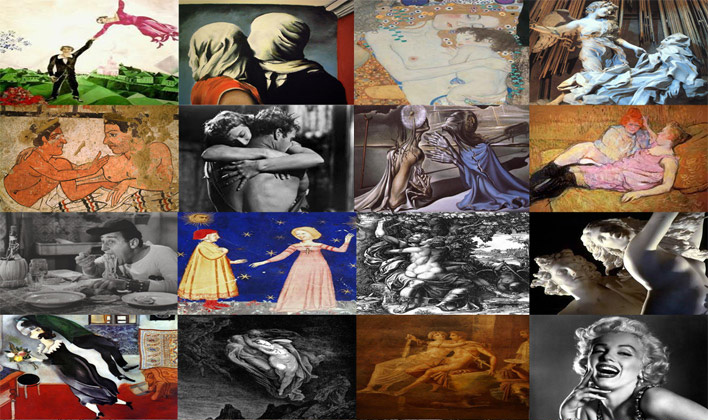The object of desire in lyric poetry: some considerations on sublimation
Abstract
Sublimation is an idea often used to give a psychoanalytic interpretation of artistic creativity. Focusing on the lyric speaker within the poem and considering the text as a mise-en-scène of poetic creation, the paper intends to investigate why sublimation could not be the right key to understanding the phenomenon. The subject’s dynamics, in modern poetry, show themselves as a continuous failure in the repeated attempt to possess the object. The speaker’s affective and cognitive desire is produced and constantly renewed by the impossibility of possessing the object (above all in its representation). But it is only in such a gap that the subject can exists. In order to feel desire, there should be an illusion of possession and representation. Subject and object create each other in lyric poem, and the former comes to coincide with the desire for the latter, it does not exist outside that desire.
Since lyric poetry shows itself as the unfolding of a subject that voices itself and is always involved in an object relation, it can be a privileged field of investigation for this kind of phenomena. Two poets will be taken into consideration: Thibaut de Champagne, a late trouvère who summons up the Provençal tradition, and Charles Baudelaire, one of the modern poets that have most deeply investigated the reality lack of sense.
Downloads
References
Barbieri, Luca, “Note sul ‘Liederbuch’ di Thibaut de Champagne”, Medioevo Romanzo, XXIII, 3 (1999): 388-416.
Baudelaire, Charles, Œuvres complètes, Ed. C. Pichois, Paris, Gallimard, Bibliothèque de la Pléiade, 1961 .
Id., Opere,trad. it. di G. Raboni e G. Montesano,Ed. G. Macchia, Milano, Mondadori, 1996.
Bellenger, Y. – Quéruel, D. (eds.), Thibaut de Champagne. Prince et Poète au XIIIe siècle, Lyon, La Manifacture (Archives de Champagne), 1987
Benveniste, Emile, Problèmes de linguistique générale, Paris, NRF, vol. I 1966, vol. II 1974.
Georges Blin, Baudelaire, Paris, Gallimard, 1939.
Brahney, Kathleen J., The Poetry of Thibaut de Champagne: a Thematic Study (PhD Thesis, Michigan State University 1976), Xerox University Microfilm, Ann Arbor, 1976.
Brix, Michel, “Modern Beauty versus Platonist Beauty”, trans. Tony Campbell, Ward 2001.
Raymond, J. Cormier – Dolly, Martha Rowe, “Aimer, souvenir, souffrir: les chansons d’amour de Thibaut de Champagne”, Romania, 99 (1978): 311-346.
Curi, Fausto, Il corpo di Dafne. Variazioni e metamorfosi del soggetto nella poesia moderna, Milano-Udine, Mimesis, 2011.
De Rougemont, Denis, L’Amour et l’Occident, Paris, Librairie Plon, 1939, trad. di L. Santucci, L’amore e l’occidente, Ed. A. Guiducci, Milano, Rizzoli, 1998.
Dragonetti, Roger, La Technique poétique des trouvères dans la chanson courtoise, Bruges, Du Tempel, 1960.
Dronke, Peter, Medieval Latin and the Rise of European Love-Lyric, Oxford, Oxford University Press, 1965.
Easthope, Antony, Poetry and Phantasy, Cambridge, Cambridge University Press, 1989.
Eigeldinger, Marc, Le platonisme de Baudelaire, Neuchatel, La Baconnière, 1951.
Ferrand, Françoise, “Thibaut de Champagne, de l’obsession du mal à la mort du chant”, Bellenger – Quéruel 1987: 77-87.
Franke, William, “The Linguistic Turning of the Symbol”, Ward 2001: 15-28.
Freud, Sigmund, Der Dichter and das Phantasieren (1908), trad. it., Il poeta e la fantasia, Opere, V, 1905-1908, Ed. C. L. Musatti, Torino, Bollati Boringhieri, 1981: 375-383.
Gilson, Etienne, La Théologie mystique de Saint Bernard, Liège, Parsi, 1934.
Giusti, Francesco, “Il soggetto creatore e la legge del reale (l’istanza auto-censoria interna all’opera)”, Between,II. 3 (2012), www.Between-journal.it.
Id., “Il complesso di Icaro e il canto del cigno, ovvero due miti del soggetto lirico”, Strumenti Critici, 1 (2013): 93-118.
Guiette, Robert, “D’une poésie formelle en France au Moyen Age”, Romanica,8 (1960): 9-23.
Guiette, Robert, Forme et senefiance, Geneve, Droz, 1978.
Lacan, Jacques, Seminaire VII. L’étique de la psychanalyse 1959-1960, Paris, Seuil, 1986, trad. it. Il Seminario. Libro VII. L’etica della psicanalisi, 1959-1960, Ed. G. B. Contri, Torino, Einaudi, 1994.
Menard, Philippe, “Le dieu d’Amour, figure poétique de trouble et du désir dans les poésies de Thibaut de Champagne”, Bellenger – Quéruel 1987: 65-75.
Pichois, Claude, “La Littérature française à la lumière du surnaturalisme”, Le Surnaturalisme français. Actes du colloqui organisé à l’Université Vanderbilt les 31 mars et 1er avril 1978, Neuchâtel, A la Baconnière, 1979 : 9-28.
Prévost, Jean, Baudelaire, essai sur l’inspiration et la création poétiques, Cadeilhan, Zulma, 1997.
Raby, F. J. E., A History of Christian-Latin Poetry from the Beginnings to the Close of the Middle Ages, Oxford, Oxford University Press, 1952.
Recalcati, Massimo, Il miracolo della forma. Per un’estetica psicanalitica, Bruno Mondadori, Milano, 2011.
Id., Ritratti del desiderio, Raffaello Cortina, Milano, 2012.
Spoerri, Théophil, “Wilhelm von Poitiers und die Anfänge der Abendländischen Poesie”, Trivium,II (1944): 255-277
Thibaut de Champagne, The Lyrics of Thibaut de Champagne, Ed. Kathleen J. Brahney, New York, Garland (Garland Library of Medieval Literature, 41), 1989.
Toury, Marie-Noëlle, “Les chansons de Thibaut de Champagne: l’écriture et le livre”, Bellenger – Quéruel 1987 : 45-55.
Ward, Patricia A. (ed.), Baudelaire and the Poetics of Modernity, Nashville, Vanderbilt University Press, 2001.
Zaganelli, Gioia, Aimer sofrir joïr. I paradigmi della soggettività nella lirica francese dei secoli XII e XII, Firenze, La Nuova Italia, 1982.
Zink, Michel, La Subjectivité littéraire, Paris, Presses Universitaires de France, 1985.
Zumthor, Paul, Essai de poétique médiévale, Paris, Le Seuil, 1972.
Copyright Notice
You are free to copy, distribute and transmit the work, and to adapt the work. You must attribute the work in the manner specified by the author or licensor (but not in any way that suggests that they endorse you or your use of the work).









